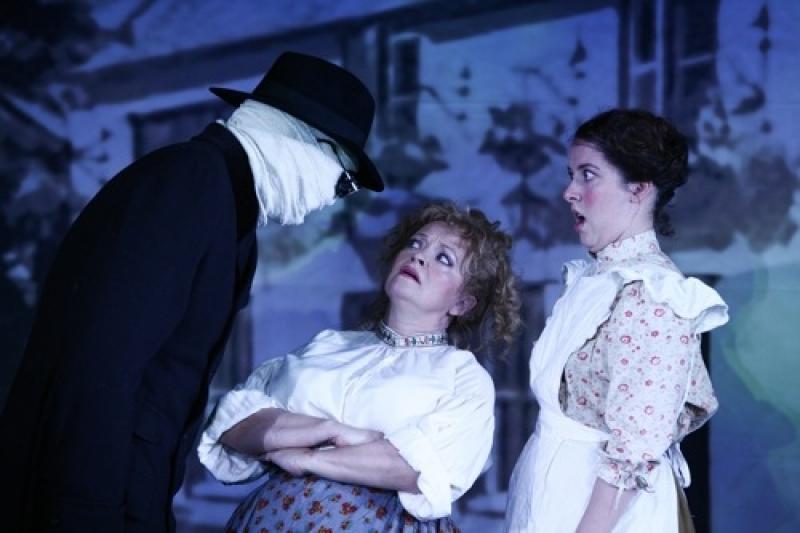The Invisible Man, Menier Chocolate Factory | reviews, news & interviews
The Invisible Man, Menier Chocolate Factory
The Invisible Man, Menier Chocolate Factory
Jokes and old-fashioned illusions aside, what's the point of this HG Wells spoof?

“It’s this ghost they’re talkin’ about. I’m feelin’ an emanation meself. Unless I ‘ad too many pickled eggs last night.” If that’s the sort of crack that tickles your fancy, you’ll find plenty to make you chuckle in Ken Hill’s spoofish take on H G Wells’s novella, first presented at Theatre Royal Stratford East in 1991.
Wells’s 1897 science-fiction yarn was originally written for a magazine in serial form, and as such it’s full of tingling suspense. Hill, on the other hand, never offers even the most fleeting of chills, choosing instead to send the story up. His version relies, for its appeal, on sight gags, innuendo, caricature and above all special effects (created by Paul Kieve). It’s cheerfully cod, and even broadly charming, as far as it goes. But it’s not long – particularly in Talbot’s stodgy staging – before the joke begins to wear thin.
The action unfolds in an Edwardian music hall, where a dapper MC introduces a troupe of jolly end-of-the-pier Pierrots whose song-and-dance antics frame the tale itself. Their rather superfluous antics out of the way, we are plunged into a wintry night in the West Sussex village of Iping, where a mysterious stranger, wrapped in bandages and wearing a long coat and glasses, arrives at the local inn. Painted flats and cloths, designed by Paul Farnsworth, and handfuls of fake snow flung about by the actors, set the scene; doomy melodramatic music accompanies every appearance of the sinister figure (an unrecognisable John Gordon Sinclair). His peculiar behaviour quickly causes consternation among Iping’s inhabitants, who include the inn’s busty landlady Mrs Hall (Maria Friedman), her dopey servant Millie (Natalie Casey), hearty Squire Burdock (Jo Stone-Fewings) and bluestocking suffragette schoolteacher Miss Statchell (Geraldine Fitzgerald), as well as an oddball assortment of camp clergy, a lecherous physician and a dunderheaded police constable.
 Objects fly unaided through the air; doors open and close; unseen hands rifle through drawers or strike piano keys; and the residents find themselves attacked by an invisible assailant with a menacing, mocking, disembodied voice. This entity even makes free with Mrs Hall’s ample bosom, jiggling her breasts mercilessly and vigorously. At first all imagine that they are victims of a haunting by some restless spectre. But suspicion quickly falls on Mrs Hall’s irascible guest, who is in fact Griffin, a scientist whose condition is the result of a pioneering experiment, and who, in one of the show’s most impressive moments, peels away his bandages to reveal the uncanny nothingness beneath, drawing on a cigarette with his invisible lips as he does so. Griffin will stop at nothing less than world domination. He terrifies a tramp, Marvel (an irksomely chirpy Gary Wilmot), into becoming his unwilling henchman and aiding him in his getaway, while the villagers determine to track down and trap him.
Objects fly unaided through the air; doors open and close; unseen hands rifle through drawers or strike piano keys; and the residents find themselves attacked by an invisible assailant with a menacing, mocking, disembodied voice. This entity even makes free with Mrs Hall’s ample bosom, jiggling her breasts mercilessly and vigorously. At first all imagine that they are victims of a haunting by some restless spectre. But suspicion quickly falls on Mrs Hall’s irascible guest, who is in fact Griffin, a scientist whose condition is the result of a pioneering experiment, and who, in one of the show’s most impressive moments, peels away his bandages to reveal the uncanny nothingness beneath, drawing on a cigarette with his invisible lips as he does so. Griffin will stop at nothing less than world domination. He terrifies a tramp, Marvel (an irksomely chirpy Gary Wilmot), into becoming his unwilling henchman and aiding him in his getaway, while the villagers determine to track down and trap him.
For all this hokum to engage – particularly when its treatment is so relentlessly tongue in cheek – it needs to be slick, and performed at breakneck speed. Talbot’s production never properly gathers momentum, and the slapstick and pratfalls quickly become tedious and repetitive. There are lively turns from Friedman, Stone-Fewings and Christopher Godwin as Squire Burdock’s factotum, who in his varied career has worked as everything from a Bangkok barman to a St Petersburg cryptographer, and the rest of the cast are industrious – but a show this determinedly light surely shouldn’t feel so effortful. There is some wit and ingenuity on display here; but as the evening wears on, you feel you have to look harder and harder to find it.
- The Invisible Man at the Menier Chocolate Factory until 13 February, 2011
- Find H G Wells on Amazon
Explore topics
Share this article
Add comment
The future of Arts Journalism
You can stop theartsdesk.com closing!
We urgently need financing to survive. Our fundraising drive has thus far raised £49,000 but we need to reach £100,000 or we will be forced to close. Please contribute here: https://gofund.me/c3f6033d
And if you can forward this information to anyone who might assist, we’d be grateful.

Subscribe to theartsdesk.com
Thank you for continuing to read our work on theartsdesk.com. For unlimited access to every article in its entirety, including our archive of more than 15,000 pieces, we're asking for £5 per month or £40 per year. We feel it's a very good deal, and hope you do too.
To take a subscription now simply click here.
And if you're looking for that extra gift for a friend or family member, why not treat them to a theartsdesk.com gift subscription?
more Theatre
 Troilus and Cressida, Globe Theatre review - a 'problem play' with added problems
Raucous and carnivalesque, but also ugly and incomprehensible
Troilus and Cressida, Globe Theatre review - a 'problem play' with added problems
Raucous and carnivalesque, but also ugly and incomprehensible
 Clarkston, Trafalgar Theatre review - two lads on a road to nowhere
Netflix star, Joe Locke, is the selling point of a production that needs one
Clarkston, Trafalgar Theatre review - two lads on a road to nowhere
Netflix star, Joe Locke, is the selling point of a production that needs one
 Ghost Stories, Peacock Theatre review - spirited staging but short on scares
Impressive spectacle saves an ageing show in an unsuitable venue
Ghost Stories, Peacock Theatre review - spirited staging but short on scares
Impressive spectacle saves an ageing show in an unsuitable venue
 Hamlet, National Theatre review - turning tragedy to comedy is no joke
Hiran Abeyeskera’s childlike prince falls flat in a mixed production
Hamlet, National Theatre review - turning tragedy to comedy is no joke
Hiran Abeyeskera’s childlike prince falls flat in a mixed production
 Rohtko, Barbican review - postmodern meditation on fake and authentic art is less than the sum of its parts
Łukasz Twarkowski's production dazzles without illuminating
Rohtko, Barbican review - postmodern meditation on fake and authentic art is less than the sum of its parts
Łukasz Twarkowski's production dazzles without illuminating
 Lee, Park Theatre review - Lee Krasner looks back on her life as an artist
Informative and interesting, the play's format limits its potential
Lee, Park Theatre review - Lee Krasner looks back on her life as an artist
Informative and interesting, the play's format limits its potential
 Measure for Measure, RSC, Stratford review - 'problem play' has no problem with relevance
Shakespeare, in this adaptation, is at his most perceptive
Measure for Measure, RSC, Stratford review - 'problem play' has no problem with relevance
Shakespeare, in this adaptation, is at his most perceptive
 The Importance of Being Earnest, Noël Coward Theatre review - dazzling and delightful queer fest
West End transfer of National Theatre hit stars Stephen Fry and Olly Alexander
The Importance of Being Earnest, Noël Coward Theatre review - dazzling and delightful queer fest
West End transfer of National Theatre hit stars Stephen Fry and Olly Alexander
 Get Down Tonight, Charing Cross Theatre review - glitz and hits from the 70s
If you love the songs of KC and the Sunshine Band, Please Do Go!
Get Down Tonight, Charing Cross Theatre review - glitz and hits from the 70s
If you love the songs of KC and the Sunshine Band, Please Do Go!
 Punch, Apollo Theatre review - powerful play about the strength of redemption
James Graham's play transfixes the audience at every stage
Punch, Apollo Theatre review - powerful play about the strength of redemption
James Graham's play transfixes the audience at every stage
 The Billionaire Inside Your Head, Hampstead Theatre review - a map of a man with OCD
Will Lord's promising debut burdens a fine cast with too much dialogue
The Billionaire Inside Your Head, Hampstead Theatre review - a map of a man with OCD
Will Lord's promising debut burdens a fine cast with too much dialogue

Comments
...